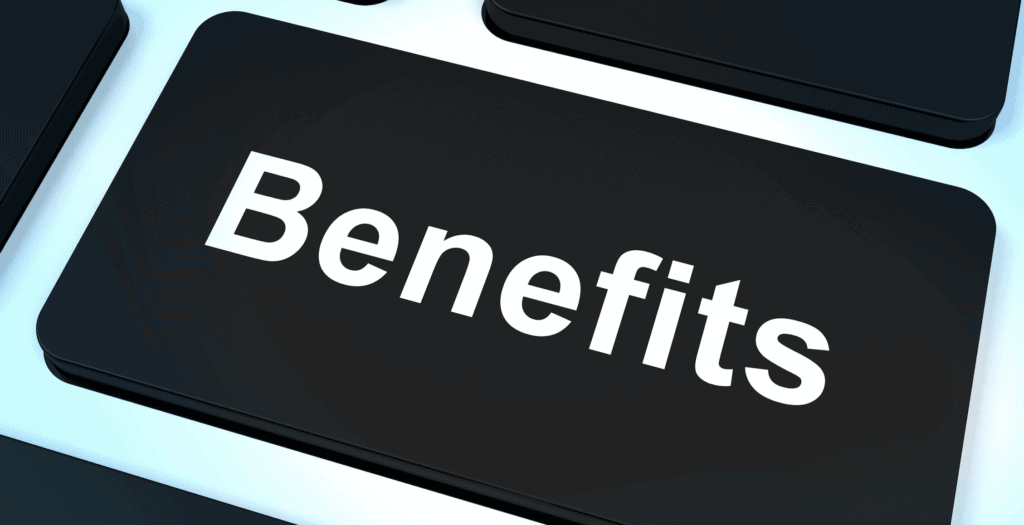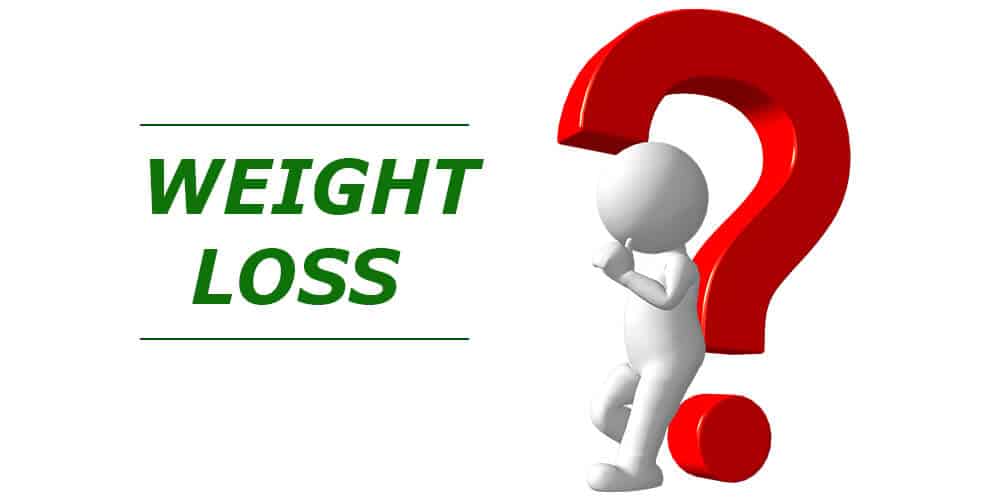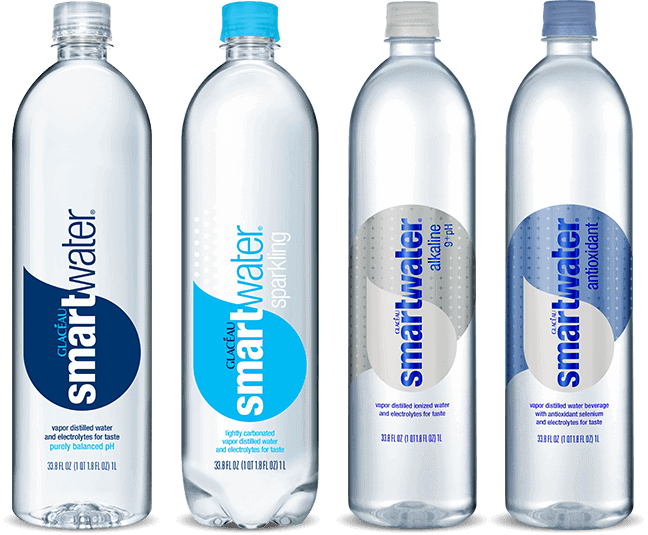Smart Water is in nearly every grocery store and gas station in the country. The product claims to be better for you due to added electrolytes. While extra electrolytes are usually beneficial, they only assist in weight loss when a person is electrolyte-deficient – and even then, the weight loss would be incidental and modest.
We asked our research team to look deeper into Smart Water to determine if the added ingredients made it worth the extra cost. Our team examined all available scientific research, and helped us break everything down to bring you the Bottom Line on the product. Read on to learn what we found.
Smart Water can be purchased through their Official Site.
What is Smart Water?
Smart water is water that has been distilled by vapor and contains electrolytes. It goes through purification, during which time all the minerals are removed. It has no additives, but the Smart Water manufacturing company adds electrolytes, potassium, and magnesium chloride. It can also be referred to as enhanced water because it is water that has added components.
In terms of weight loss, what does water offer?
- International Journal of Obesity – “Replacement of DBs [diet beverages] with water after the main meal in women who were regular users of DBs may cause further weight reduction during a 12-month weight maintenance program.”
- Obesity (A Research Journal) – When water was compared to drinks that contained non-nutritive sweeteners (NNS), the results were surprising. “Results suggest that NNS beverages can be an effective tool for weight loss and maintenance within the context of a weight management program.”
- Contemporary Clinical Trials – There’s further research showing the possible weight-loss benefit of NNS. “Acute and medium-term intervention studies suggest that non-nutritive sweeteners (NNS) are beneficial for weight loss, however, there is limited human data on the long-term effects of consuming NNS on weight loss, maintenance, and appetite.”
Smart Water Competitors
| Product |
Review
|
|
|---|---|---|
| Ab Slim | read | |
| Align | read | |
| Acxion | read | |
| 4 Day Diet | read | |
| Noom | read |
How Did Smart Water Start?
J. Darius Bikoff started Smart Water in May 1996. He aimed to have the nutrients which he otherwise ate alongside water, in the form of vitamin supplements, to be incorporated into the water itself, instead of taking them separately. The company’s name was Glaceau Smart Water.
He started distributing the Smart Water to natural food stores in New York, which were small and independent at the time. Soon after, the product became successful, and he formally launched state-wide.
When his products were firmly established, he started developing relationships with distributors, which enabled him to start distributing nationwide.
LVMH bought a 30% stake in company shares. LVMH sold those shares to a different investor, and this new investor subsequently sold as well. This pattern continued until the Coca-Cola company finally bought the company for $4.1 billion on May 25th, 2007.
The Smart Water lineup includes:
- Smartwater Original
- Smartwater Flavor-infused
- Smartwater+
- Smartwater Alkaline 9+pH
- Smartwater Antioxidant
Other water products by the Coca-Cola Company:
- Dasani® Water
- Fresca Sparkling Soda Water
- Glacéau Vitaminwater
- AHA Flavored Sparkling Water
- Topo Chico Mineral Water
- Ciel Mineralizada
- Powerade Power Water
- Bodyarmor Sportwater
Coca-Cola and the Better Business Bureau (BBB)
Coca-Cola has been accredited by the BBB since 1952, and they’ve been in business for 70 years. Nine customers have reviewed them on the site, leaving a 1/5 star rating. The BBB account shows 41 complaints closed during the past three years, with 16 in the previous 12 months.

Scroll below for one of the best products we’ve seen over the last year.
Smart Water Claims
Smart Water is supposed to be better for you than regular water because of its extra ingredients. It boasts of the fact that it can have a distinct taste (from the added electrolytes) and also offers more benefits than the average bottled water or tap water can. The manufacturer also claims that it has all been distilled by vapor, and it is obtained from municipal water systems.
The water is wholly rid of all its components apart from hydrogen and oxygen. After that, the company adds extra ingredients: potassium bicarbonate, calcium chloride, and magnesium chloride. These electrolytes, which are added, do not have the ”Gatorade” effect, with added sugars and unnecessary chemical additions.
Smart Water Ingredients
The following are the Smart Water ingredients, measured per liter:
- Distilled water
- 15 mg of magnesium
- 10 mg of calcium
- 10 mg of potassium carbonate
- Smartwater Original: Vapor Distilled Water, Calcium Chloride And Magnesium Chloride And Potassium Bicarbonate (Electrolyte Sources*) *Electrolytes Added For Taste
- Smartwater Flavor-Infused: Vapor Distilled Water, Natural Flavors, Calcium Chloride And Magnesium Chloride And Potassium Bicarbonate (Electrolyte Sources*). *Electrolytes Added For Taste
- Smartwater+ -:Vapor Distilled Water, Natural Flavor, Calcium Chloride And Magnesium Chloride, Potassium Carbonate (Electrolyte Sources*)*Electrolytes Added For Taste
- Smartwater Alkaline 9+Ph: Vapor Distilled Water, Calcium Chloride And Potassium Bicarbonate (Electrolyte Sources*) *Electrolytes Added For Taste
- Smartwater Antioxidant: Vapor Distilled Water, Calcium Chloride And Magnesium Chloride And Potassium Bicarbonate (Electrolyte Sources*), Sodium Selenate. *Electrolytes Added For Taste.
Smart Water Flavors
Glaceau Smart Water flavors include:
- Smartwater® (Original, Alkaline, Antioxidant)
- Smartwater Flavor-infused (cucumber lime, strawberry blackberry, pineapple kiwi, and passionfruit mango)
- Smartwater+ (clarity: ginseng + green tea extracts, renew: dandelion + lemon extracts, tranquility: ashwagandha + tangerine extracts)
Does Smart Water Work?
Smart bottled water has been made to seem like it is a revolutionary deal. This is probably because of the name that it was given by its creator, which was meant to entice consumers.
On the contrary, it has nothing to do with making a person smart or working smartly in the human body (almost as if other types of water operate in the body in any other way), but this is what anyone would be led to think when they first hear of this water.
As far as we are concerned, there is no scientific backing for the benefits of Smart Water. And even though the three electrolytes can help when it comes to recovery, there is nothing more to it.
Water is vital for life. Furthermore, it also plays a key role for anyone who wants to lead a healthy lifestyle and can help people who are trying to lose weight.

Smart Water Benefits and Results
Smart Water has the potential of helping people who are in fitness training as they tend to take fewer water breaks. Those who exercise in the heat for prolonged hours will automatically sweat profusely. This will result in their bodies needing some extra electrolytes.
The role of these electrolytes is to help with their heart functioning well under the stress of exercise. By drinking Smart Water during their few breaks, they will have access to these vital electrolytes easily.
In general, drinking water can be healthy, as per Nutrition Reviews. Additionally, Preventing Chronic Disease and Drinking Water and Health note that certain populations can benefit from more drinking water.
Details on Smart Water And Weight Loss
Smart Water is just regular water, minus the minerals, and with some electrolytes added. So there’s honestly nothing special here. Nothing inside this will somehow cut your calories or make your body gain extra nutrients.
However, we have to keep in mind that the main ingredient in this product is, well, water. Water just happens to constitute 50 to 60 percent of our bodies. This just goes to show how important water is.
There are a lot of dangers of being dehydrated. The healthy functioning of your organs will slow. You also need to remember that dehydration can contribute to adverse water weight circumstances, and any form of added weight during your weight loss journey is unwanted.
Water weight comes about when your body reacts to not having enough water. When it detects that sufficient water is not being supplied, the body’s automatic retaliation is to store as much water as it possibly can. This storage of water is what results in excess water weight.
So hopefully, you can now start to see the impact of not drinking enough water. And that’s not all. There are more reasons why you are supposed to drink water if you would like to lose weight.
First, the most commonly known reason for drinking water when dieting is that it gives you the feeling of being full, according to research published in Nutrition Reviews and Frontiers in Nutrition. The water fills your stomach right before you eat, and as a result, you end up consuming less food, per Obesity (Silver Spring).
Sometimes when we feel thirsty, we mistake the hunger feeling. This happens because the same thing that makes us think we are thirsty makes us feel hungry. And even though it can be distinguished most of the time, many people mistake thirst for hunger.
This is the reason why it is advisable to drink water right before we eat, or whenever we feel hungry. Not only will it help to satisfy you more quickly, but it will also make sure that if it is thirst you are feeling, it will wear off, and you might not even have to eat or will eat less.
Overall, more research is needed to associate drinking water with weight loss, according to Nutrients.

Effect of Water on Metabolism
There are so many more reasons why drinking water is essential for weight loss. One of the most crucial things it does is speed up metabolism. Metabolism is the process by which calories are burned inside the body. When we drink water, for example, a lot of energy is used, and therefore calories are burnt up, as the body is trying to heat the water taken in.
Furthermore, water can boost your energy levels when you are working out. Staying hydrated during workouts will prevent you from being slow and becoming fatigued quickly.
To find out if you are taking in enough water, a good trick is to pee before your exercise session. Afterward, get on a scale and measure your weight. Then after you have finished working out, get on the scale, and measure yourself again.
If your weight has dropped, then it means that you are not taking in enough water, and there is a danger of having water weight gain due to dehydration.
Energy for Your Workouts
Water will enable you to have power workouts, which will speed up your efforts in weight loss. This means that you will not need to take any other energy drink before, during, or after your workout session.
These energy drinks usually have high amounts of sugar, which supply energy. This translates into calories. The advantages of taking water instead of high-calorie energy drinks are apparent- calories are unwanted in any weight loss journey.
Potential Smart Water Side Effects
According to our research, there aren’t any known side effects of drinking Smart Water.
Smart Water Lawsuits
We have not come across any Smart Water lawsuits so far.
Update 2020: We found a voluntary SmartWater recall in 2010, due to quality issues with a particular batch of products.
Smart Water Alternatives
When a person decides to buy Smart Water, it is usually due to one of two reasons. The first being that they only put their trust in bottled water and do not feel safe when they drink tap water.
The second reason would be that the word ”smart” in the product name enticed them to do so, or they just want to try something new, and it does not matter if it could be a little more costly.
The bottom line is that the only alternative to water is simply: water. For those who want more or something a little different, we have compiled a list of other kinds of bottled water that you can try. They also have something that makes them more than just water. Below is the list.
Evian
This water is said to have passed through some complicated layers underground. According to its manufacturers, rain and snow worked their way inside a spring, which was underground.
Here, the water is harvested, having naturally acquired minerals and electrolytes. It is said that it has a lot of minerals and the electrolyte level is high. It also has a thin texture.
Aquafina
Aquafina claims to be the purest drinking water available by its manufacturers. They say that this water goes through a highly complex filtration process called HydRO-7.
This process supposedly goes through seven steps, which ensure that all the solids are taken out. This, according to them, is a process that takes away much more solids than the other methods of filtration. It has been described as voluptuous water.
Voss
This one comes from an artesian well located in Norway. It happens to be costly water, which is said to be gravelly. It also contains minerals.
Fiji Natural Artesian Water
This water originates from Fiji, as the name suggests, on the island of Viti Levu.
It comes from tropical rain and is filtered through the volcanic rock in that area. As it is getting filtered, it picks up electrolytes and minerals. It goes to an aquifer underground where it is ”stored.”
Mountain Valley Spring Water
This is spring water that comes from Arkansas. There is an aquifer to which rainwater goes, over a very long amount of time; 3500 years. It has been said to have a high pH, and so it can work well to neutralize highly acidic foods.
It has a sweet flavor, which gives a good feeling to the mouth.
Nestle Pure Life
As the name suggests, this is pure water. It is obtained from municipal sources of water or a well. It is then softened and filtered, demineralized, and then re-mineralized. Disinfection is then done by using ultraviolet light and ozone.
It has a neutral flavor, and the taste is clean without the residue of any minerals.
Smart Water Price
Smart Water price ranges, depending on the amount that you want to purchase. One liter of Smart Water bottled water is $1.68 6 x 16.9 oz costs $5.49, and 6 x 1L costs $8.98. You can purchase a 12-pack of 1.5-liter bottles for around $16-$37.
Smart Water Consumer Care Information
- Address: The Coca-Cola Company PO. Box 1734 Atlanta, GA 30301
- Phone: +1 800-520-2653
What Users Are Saying
“Tastes fine but the additives backfired on me. The more Smartwater I drank, the thirstier I got. I kept getting cotton mouth and didn’t know why. I stopped drinking it and cotton mouth went away.”
“Alkaline water is a product that is very valuable to our overall health. This particular Smart Water item is well worth the price.”
The Bottom Line on Smart Water
Alrighty, we’ve come to the conclusion that we bet you’ll be interested in. While we were pretty interested in Smart Water to start off, it quickly became apparent that this one doesn’t live up to the hype. We like that it hydrates, but we are hesitant to suggest something that isn’t any different from a similar product. If consumer reviews are to be trusted, the taste isn’t worth the price tag, which is also a problem.
If weight-loss is the end goal, we suggest drinking plenty of water and maybe trying out a support program designed to help you adopt healthy lifestyle changes to reach your weight-loss goals.
Among the best products we’ve seen this year is one called Noom. It combines human coaching, food and exercise tracking, personalized meal plans, expert articles, and more to keep you on track. Dieters are reporting seeing amazing results.
The makers of Noom are offering a free trial offer to Dietsupplement readers to show just how confident they are in the program.
| Smart Water Customers Also Bought: |
Effective
|
Testimonials
|
Free Trial Offer
|
|||
|---|---|---|---|---|---|---|
| Explanation of Chart | ||||||
|
Noom (4.6)SPONSORED |
||||||
|
Garcinia Cambogia (3.9) |
||||||
|
Caralluma Fimbriata (3.4) |
||||||
|
Forskolin (3.1) |
||||||
|
CLA (2.9) |
||||||
Smart Water Questions & Answers
Smart Water is a brand of water that has been distilled by vapor and contains added electrolytes such as potassium and magnesium chloride. It is marketed as a better option than regular water due to the added ingredients.
Smart Water was founded by J. Darius Bikoff in May 1996. The company’s name was Glaceau Smart Water. In 2007, the Coca-Cola company bought the company for $4.1 billion.
The Smart Water lineup includes Smartwater Original, Smartwater Flavor-infused, Smartwater+, Smartwater Alkaline 9+pH, and Smartwater Antioxidant. Other water products by the Coca-Cola Company include Dasani® Water, Fresca Sparkling Soda Water, Glacéau Vitaminwater, AHA Flavored Sparkling Water, Topo Chico Mineral Water, Ciel Mineralizada, Powerade Power Water, and Bodyarmor Sportwater.
Smart Water is supposed to be better for you than regular water due to its extra ingredients. It is marketed as having a distinct taste from the added electrolytes and offering more benefits than other bottled or tap water. The manufacturer claims that it is obtained from municipal water systems and has all been distilled by vapor.
Glaceau Smart Water flavors include Smartwater® (Original, Alkaline, Antioxidant), Smartwater Flavor-infused (cucumber lime, strawberry blackberry, pineapple kiwi, and passionfruit mango), and Smartwater+ (clarity: ginseng + green tea extracts, renew: dandelion + lemon extracts, tranquility: ashwagandha + tangerine extracts).
Smart Water can be purchased using their Official Site.
Smart Water does not have any miraculous properties. It is a bottled water with added electrolytes that can provide some benefits such as hydration, but it does not cause significant weight loss.
While Smart Water may be beneficial for electrolyte-deficient individuals, it is not significantly better for you than regular water if you are not deficient in electrolytes.
Smart Water can be a good option for hydration during exercise because the added electrolytes can help replace those lost through sweat.
Smart Water side effects may include increased urination.
Yes. Smartwater contains a blend of electrolytes that is safe for most people.
Smart Water ingredients include distilled water, magnesium, calcium, and potassium carbonate. Electrolytes are added to the water, which includes potassium bicarbonate, calcium chloride, and magnesium chloride.
The added electrolytes in Smart Water include potassium bicarbonate, calcium chloride, and magnesium chloride.
Smartwater contains three electrolytes: potassium bicarbonate, calcium chloride, and magnesium chloride.
There’s no scientific research proving the effectiveness of Smart Water. There is research proving electrolytes help the recovery process, but nothing specific to this formulation. It’s also known that hydration is essential to weight-loss.
Smartwater originates from municipal and protected groundwater sources before being supplemented with electrolytes.
After vapor distillation, smartwater is meticulously filtered using Glaceau’s exclusive filtration process and enhanced with electrolytes.
Smartwater is bottled at a variety of facilities that have access to municipal and protected groundwater sources.
The Coca-Cola Company owns Smart Water.
No, Smart Water doesn’t contain calories.
Smart Water vapor distillation is the process of removing impurities from the product.
The original Smart Water has a balanced pH level, so it is not acidic. The brand also offers Smart Water Alkaline, where the pH is higher than 9.
Smart Water bottles are BPA-free and recyclable. The bottle is also made of up to 30% of plant-based materials.
While Smart Water does undergo a distillation process, it also contains added electrolytes such as calcium chloride and potassium bicarbonate. This helps to give the water an improved taste and provide additional health benefits for people who are exercising, working in high temperatures or at risk of dehydration. Smart Water is also free from contaminants such as chlorine, fluoride and other minerals normally found in tap water. It is therefore ideal for people who want to stay hydrated with clean and refreshing drinking water.
Smartwater is a brand of bottled water produced by the Coca-Cola Company. It contains added electrolytes to create an enhanced form of hydration, with an advertised taste that is vapor-distilled and enhanced with minerals. Regular water refers to any drinking water without added minerals or electrolytes, such as tap or filtered water. Smartwater has pH levels of 6-7, while regular tap and filtered water generally have a pH level around 7 (with some regional variations). Additionally, Smartwater’s mineral content varies by region, where it contains calcium in the US but not in other locations. It also contains 3–4 mg/L of potassium compared to very low levels found in regular tap and filtered waters. Finally, Smartwater does tend to cost more than regular drinking waters due to the added ingredients and production process used for its manufacture.
Coca-Cola has been accredited by the BBB since 1952 and has been in business for 70 years. According to the BBB website, nine customers have reviewed them on the site, leaving a 1/5 star rating. The BBB account shows 41 complaints closed during the past three years, with 16 in the previous 12 months.
Smart Water is a bottled water with added electrolytes, while other water products by the Coca-Cola Company such as Dasani® Water, AHA Flavored Sparkling Water, and Topo Chico Mineral Water may have different additives or flavors.
Smart Water competitors include Ab Slim, Align, Acxion, and 4 Day Diet.
Smart Water is not necessarily better than regular water. While the added electrolytes can have some benefits, there is no scientific evidence to support the claim that Smart Water is superior to other sources of water.
Smart Water is not unhealthy, but it is not necessarily healthier than regular water. While the added electrolytes can have some benefits, there is no scientific evidence to support the claim that Smart Water is a particularly healthy beverage.
Smart Water may help with weight loss if a person is electrolyte-deficient, but any weight loss benefits would be incidental and modest.
Smart Water does not have any known side effects. However, excessive consumption of any beverage, including Smart Water, can lead to water intoxication, which is a potentially life-threatening condition.
Article Sources
- https://www.drinksmartwater.com/
- https://noom.8utb.net/c/1720052/500038/8591
- https://noom.8utb.net/c/1720052/500038/8591
- https://noom.8utb.net/c/1720052/500038/8591
- https://www.nature.com/articles/ijo2017306
- https://onlinelibrary.wiley.com/doi/full/10.1002/oby.21327
- https://www.sciencedirect.com/science/article/pii/S1551714416302683
- https://www.ncbi.nlm.nih.gov/pmc/articles/PMC2908954/
- https://www.ncbi.nlm.nih.gov/pmc/articles/PMC3625443/
- https://www.ncbi.nlm.nih.gov/books/NBK234161/
- https://www.ncbi.nlm.nih.gov/pmc/articles/PMC2929932/
- https://www.ncbi.nlm.nih.gov/pmc/articles/PMC4901052/
- https://www.ncbi.nlm.nih.gov/pmc/articles/PMC2859815/
- https://www.ncbi.nlm.nih.gov/pmc/articles/PMC4728633/
- https://www.amazon.com/gp/customer-reviews/R10PG0WWBI7LPB/
- https://www.amazon.com/gp/customer-reviews/R30HEN2HJI1Y65/
- https://noom.8utb.net/c/1720052/500038/8591
- https://noom.8utb.net/c/1720052/500038/8591
Partner with Us!
Looking to promote your weight-loss products or services?
Our platform reaches a dedicated audience actively seeking the best solutions. Contact us to explore advertising opportunities and grow your brand with us.
Get in Touch

